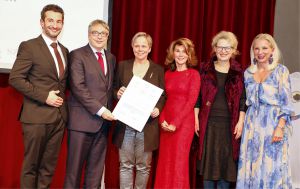On 15 October, “Musiktherapie mit Geflüchteten” [Music Therapy with Refugees]—a cooperative project of the mdw and the organisation Integrationshaus—was awarded this year’s MYKI-Kinderschutzpreis [Child Protection Prize] in one of its four categories.
The children’s protection initiative MYKI (My Kids – kinderschutz-preis.at) is an independent and non-partisan association that works to strengthen child protection and children’s rights in Austria. The My Kids website states: “This prize is awarded to individuals, institutions, and initiatives that work actively and creatively for children and/or help to improve children’s living conditions, thereby elevating the societal importance of child protection and children’s rights in Austria.”

It was at the initiative of the mdw professor Klara Harrer-Baranyi in 2014 that the platform Musik für Geflüchtete /refugees_mdw was established, out of which a number of successful projects have since developed. One of these, the above-mentioned Musiktherapie mit Geflüchteten, was first offered in cooperation with the Integrationshaus based on work by volunteers. It was then converted into an elective for music therapy students in 2016 by Edith Wiesmüller, who has since been its supervisor.
Individual music therapy sessions lasting between 30 and 50 minutes are offered weekly to children and adolescents on the Integrationshaus premises, where a protected space equipped with instruments used in music therapy has been set up. These sessions are supplemented (where possible) by conferences with parents. Since 2015, individual courses of music therapy totalling 321 individual sessions have been offered to 22 children and adolescents with displacement-related experiences.
This project stands out for its creation of a low-threshold therapy offering for refugees—in particular children and unaccompanied minors—using the non-verbal medium of music. What music therapy seeks to do here is to create a secure and free space within the framework of a therapeutic relationship where easy-to-play instruments make it possible to engage liberally in experimentation while also experiencing self-efficacy. It can also be about listening to positively experienced music together (perhaps music from the individuals’ home countries). Music can help to mobilise resources and can serve to activate as well as relax. Actively played music is well suited to the expression of feelings, and doing so with the help from the methods used by music therapy can serve to carefully and gently address and treat psychological impairments (due to difficult life experiences such as crises, trauma, violence, and displacement). Music therapy is especially well suited to those children and adolescents who, for whatever reason, cannot express themselves verbally or can only do so in a limited fashion—and, not unimportantly, it can also create space for transcultural encounters.
More information at: mdw.ac.at/refugees_mdw

